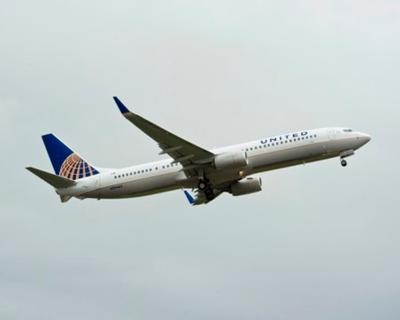Tue, Apr 16, 2013
Airline Reducing Fuel Consumption And Equivalent CO2 Emissions Through Better Operations, Technology, And Engineering
United Airlines is honoring April as "Earth Month" by announcing its new goal to save 85 million gallons of fuel in 2013, equivalent to 828,750 metric tons of CO2 or roughly $275 million dollars at current fuel prices. Fuel is the airline's single largest expense and its primary focus environmentally, and the company has several initiatives in place that will allow it to achieve its fuel efficiency goal.

"We are committed to reducing our fuel consumption and our environmental footprint," said United's Chairman, President and Chief Executive Officer Jeff Smisek. "I am proud of the actions we take every day throughout the year that help shape a more sustainable future for our customers, our co-workers and the communities we serve."
United says it has already improved its fuel efficiency by 32 percent since 1994 through programs such as improved flight planning, single engine taxiing, lighter products onboard, and use of ground power instead of the onboard auxiliary power unit to save fuel and reduce carbon emissions while aircraft are parked.
The airline is also in the process of replacing its less fuel-efficient aircraft. In 2012, United ordered 150 brand-new Boeing 737 narrowbody aircraft powered by fuel-efficient CFM engines. In addition to purchasing new aircraft, United is also improving the performance of its current fleet. The airline was the launch customer for the new Split Scimitar winglet, which is an advanced and improved winglet for the 737 Next-Gen aircraft and helps the aircraft consume up to 25 percent less fuel per seat than the 737-500 aircraft the company is retiring. United already has other winglets installed on more than 300 of its aircraft, including its entire Boeing 737 fleet and many of its 757 and 767 aircraft. Winglets reduce drag on the aircraft, ultimately reducing fuel burn and carbon emissions by up to five percent.
United's fuel savings initiatives are part of the company's larger commitment to environmental sustainability under its Eco-Skies program. As a part of that program, United operated the first U.S. passenger biofuel flight powered with a mixture of renewable algae-derived jet fuel and conventional jet fuel, and signed letters of intent to negotiate the purchase of more than 50 million gallons of sustainable biofuels. It also spearheaded the Midwest Aviation Sustainable Biofuels Initiative (MASBI), in partnership with Boeing, Honeywell's UOP, the Chicago Department of Aviation and the Clean Energy Trust, to advance commercialization of cost-competitive aviation biofuels. The airline says more than 24% percent of its ground equipment fleet is electric or alternatively fueled.
More News
Also: ANOTHER Illegal Drone, KidVenture Educational Activities, Record Launches, TSA v Shoes The Senate confirmed Bryan Bedford to become the next Administrator of the FAA, in a ne>[...]
Also: Sully v Bedford, Embraer Scholarships, NORAD Intercepts 11, GAMA Thankful Middle Georgia State University will be joining the Federal Aviation Administration’s fight ag>[...]
Also: DarkAero Update, Electric Aircraft Symposium, Updated Instructor Guide, OSH Homebuilts Celebrate The long-awaited Sonex High Wing prototype has flown... the Sonex gang tells >[...]
Also: Sully v Bedford, Embraer Scholarships, NORAD Intercepts 11, GAMA Thankful Middle Georgia State University will be joining the Federal Aviation Administration’s fight ag>[...]
30-Year USCG Veteran Aviator Focusing On Member Benefits The Vertical Aviation International Board of Directors announced its new leadership officers in April, and all began their >[...]
 Airborne 07.11.25: New FAA Boss, New NASA Boss (Kinda), WB57s Over TX
Airborne 07.11.25: New FAA Boss, New NASA Boss (Kinda), WB57s Over TX Airborne-Flight Training 07.10.25: ATC School, Air Race Classic, Samson School
Airborne-Flight Training 07.10.25: ATC School, Air Race Classic, Samson School Airborne Affordable Flyers 07.03.25: Sonex HW, BlackShape Gabriel, PRA Fly-In 25
Airborne Affordable Flyers 07.03.25: Sonex HW, BlackShape Gabriel, PRA Fly-In 25 Airborne-Flight Training 07.10.25: ATC School, Air Race Classic, Samson School
Airborne-Flight Training 07.10.25: ATC School, Air Race Classic, Samson School Rick Kenin New Board Chair of VAI
Rick Kenin New Board Chair of VAI



